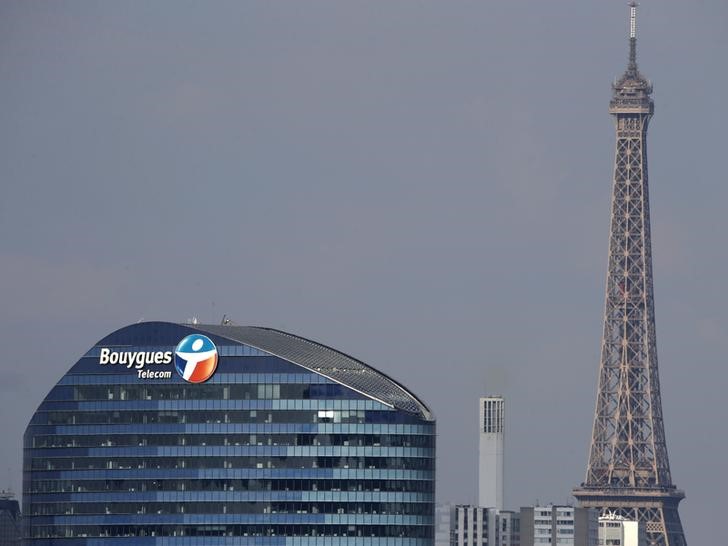By Leila Abboud and Leigh Thomas
PARIS (Reuters) - European telecoms group Altice's bid for Bouygues (PARIS:BOUY) Telecom risks creating a French operator that is "too big to fail" and that could threaten jobs, France's economy minister said on Monday, hardening his government's opposition.
The companies confirmed earlier that an offer has been submitted, sending share prices up sharply across the sector as investors hoped consolidation in the French mobile market would end a three-year-old price war.
Patrick Drahi, the billionaire backer of Altice, the majority owner of France's second-biggest telecom operator Numericable-SFR, wants to buy smaller rival Bouygues Telecom as part of a deal-making spree that has seen him buy four companies in the past 18 months.
Sources earlier told Reuters his bid valued Bouygues at about 10 billion euros (£7 billion), and was already financed by banks including BNP Paribas (PARIS:BNPP) and JP Morgan.
But despite the high price on offer, it's far from certain that Drahi can overcome the government's opposition and convince Bouygues Telecom's owner, French tycoon Martin Bouygues, to part with the unit he founded and added to the construction-to-media conglomerate founded by his father.
The Bouygues board will meet on Tuesday at 1600 GMT to discuss the Altice offer, a source close to the situation said.
"The deal is far from done, and the Bouygues board will take account of several factors, not just the size of the cheque," the source said. It will have to consider all aspects including market competition issues and the government's position, as well as whether the deal could lead to major job cuts.
The deal would reduce the number of network operators in France to three from four at a time when the merits of similar reductions already made elsewhere in Europe are being questioned by the competition regulators.
French Economy Minister Emmanuel Macron told reporters he was not opposed to France having three mobile network operators rather than the current four, but he doubted whether the Altice deal would be good for consumers, jobs and investment in the sector given the company's history of deploying huge amounts of debt to finance a series of acquisitions.
"All the synergies which could justify such a price are in fact about killing jobs," said Macron, a one-time investment banker at Rothschild, itself an adviser in the past to the Bouygues group.
"At the end of the day, is it good for the economy? The answer is 'no'."
Despite the uncertainties around the deal, Altice shares closed 12.6 percent higher, Numericable-SFR added 14.2 percent and Bouygues gained 13.2 percent, before Macron made his comments. Market leader Orange rose 7.5 percent, while low-cost player Iliad increased 10.4 percent.
Drahi is set to discuss the deal with Macron on Tuesday, according to a second person close to the deal.
The minister said on Monday he feared there was a risk the deal would create a telecoms operator that was so big that it would require a costly state bailout if too much debt were used to finance it. Altice had 24.5 billion euros in debt as of mid-May, and ratings agencies have already put it and Numericable-SFR on review for downgrade.
"I don't want to create a too-big-to-fail player with such a leverage and it's my role to ... deliver such a message," Macron said.
However, Prime Minister Manuel Valls also laid out five conditions the government would impose on any deal, such as employment guarantees, assurances on investment in high-speed broadband and the upcoming auction of radio spectrum for 4G mobile broadband networks, which the state wants to raise 2.5 billion euros from.
"Emmanuel Macron will indeed seek to ensure there are neither social consequences, nor loss of employment, but especially that we keep our goals in terms of development," Valls said.
Eric Denoyer, the chief executive of Numericable-SFR told Les Echos newspaper that the company would make commitments on jobs and investments to address the government's concerns.
"This deal has an industrial logic and will benefit investment and consumers," he said. "By marrying our two networks we will be able to accelerate our investments in high-speed broadband and mobile nationwide."
FULL PRICE
Analysts value Bouygues Telecom at between 5 and 6.5 billion euros, making a 10 billion-euro bid appear generous for a company that has been posting losses since low-cost player Iliad broke into the mobile market three years ago.
The offer is also higher than previous bids made for Bouygues Telecom, including a joint one last year from Orange and Iliad valued at 5 billion euros and one from Numericable earlier this year worth 8 billion euros.
The entire market value of the Bouygues conglomerate, which includes businesses in roads, construction and television, as well as telecoms, stood at 11.3 billion euros before the latest offer was made public.
However, acquiring Bouygues Telecom would put Numericable-SFR ahead of state-backed Orange in terms of subscribers and would also bring big savings in costs, which Berenberg analysts put at 850 million euros per year.
And to allay competition concerns, Iliad would be sold many of Bouygues Telecom's mobile masts and radio spectrum, sources familiar with the matter said.

Such an arrangement would be a massive boost for Iliad, which has been rushing to expand its own mobile network and owns far less spectrum than its three larger competitors.